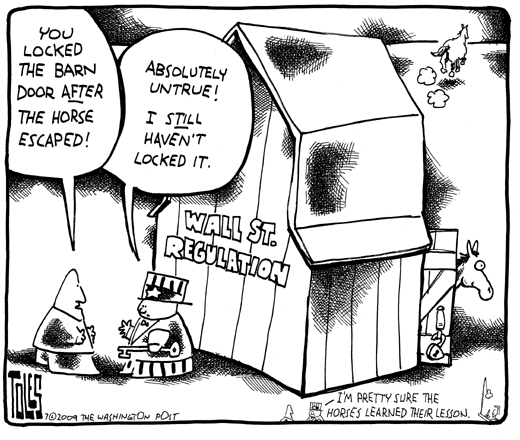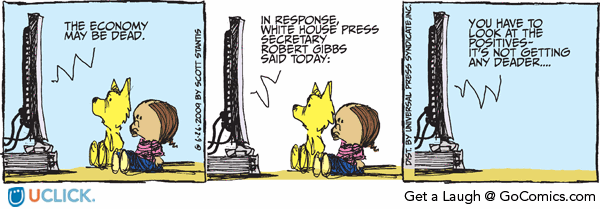|
current posts | more recent posts | earlier posts (via Andrew Sullivan)
NPR chief executive Vivian Schiller
It's almost like there's mass delusion going on in the industry They're saying we really really need it, that we didn't put up a pay wall 15 years ago, so let's do it now. In other words, they think that wanting it so badly will automatically actually change the behavior of the audience. The world doesn't work that way. Frankly, if all the news organizations locked pinkies, and said we're all going to put up a big fat pay wall, you know what, more traffic for us. News is a commodity; I'm sorry to say.
Chris Ahearn, President, Media at Thomson Reuters
Blaming the new leaders or aggregators for disrupting the business of the old leaders, or saber-rattling and threatening to sue are not business strategies - they are personal therapy sessions. Go ask a music executive how well it works. [Posted at 08/07/2009 09:10 AM by David K. Levine on Was Napster Right?  comments(0)] comments(0)] Via Robert Levine an an opinion piece in the Los Angeles Times explaining that newspapers need to be able to copyright facts in order to survive!! (You didn't think they would publish an opinion piece explaining that newspapers need to go the way of the buggy whip did you?)
If ever there was an article at war with itself, this is it.
Today, newspaper websites attract millions of readers, so why can't newspapers successfully compete online? After all, they still originate most of the nation's news. Part of the reason is that online ad rates don't begin to match print ad rates.
Why? A big reason is what economists call free-riding. Practically anyone can start a website and get software that snags fresh online news from those who originate it. Website owners pluck the freshest, most interesting reports and quickly post condensed rewrites. That costs them little, and they then surround the rewrites with cut-rate ads.
Children...children - if you are attracting millions of online readers then apparently free-riding isn't costing you your readership. If you cut off the blogs do you think your readership will go up? Or down? Links to articles on blogs (this one for example) drive traffic.
Technological change obsoletes business models. Most likely it means the end of the daily newspaper as we know it. Does it mean the we will spend less money and effort gathering news? Unlikely...as reporting from newspapers disappears the demand for news won't go down. So demand for substitutes with different business models - weekly newsmagazines, television news, blogs, will go up. Many reporters and a few newspapers executives will make the transition to new business models. The rest will join automobile workers on the unemployment line. [Posted at 08/03/2009 06:19 AM by David K. Levine on Copyright  comments(1)] comments(1)] [Posted at 07/29/2009 08:32 AM by John Bennett on Financial Crisis  comments(0)] comments(0)] There is an article by my colleague from the law school Scott Kief and Henry Smith arguing that there is no patent crisis. They don't have any data to back this up. They are very concerned about predictability. Here is a modest proposal: do away with patents - then it will be perfectly predictable, all litigation will fail. they do have some remedies - while I disagree with them about patents I think their remedies are generally better than those under discussion in Congress. In particular removing the presumption of patent validity seems a useful thing to do. [Posted at 07/22/2009 02:35 PM by David K. Levine on Patents (General)  comments(4)] comments(4)] Just kidding. A good day for mail; a bad day for innovation. From Mario Stargard:
Here in Canada, Big Pharma won a case brought by Generic drug
manufacturers challenging the constitutionality of protecting research
results of drugs. Ironically, the companies whose drugs are being
protected in this scheme are called the innovators. Seems to me that
by preventing Generics from using study data for 8 years means that
they have little to no chance to innovate further advances which in
turn slows down everybody's innovation, except big pharma, of course,
as they will always have access to their own data. As we've seen
before, large companies with IP protection are not known for
innovation.
link here
Mario [Posted at 07/22/2009 02:30 PM by David K. Levine on Against Monopoly  comments(4)] comments(4)] Richard Corsale write:
Hi David,
I wanted to point out one team of software developers thats doing this right
now, and actually has been for some time.
link here
Thomas and Amy are framework developers that publish some of the most
intense and widely used front end javascript frameworks on the web. As I'm
sure you know every framework is released under the most liberal license
that can be found, usually MIT or BSD and it would appear that its next to
impossible to sell a copy of any framework these days. They seem to have
found a really ingenious way to make a bundle selling ebooks! if you go to
link here or link here you can see their ebook
prominently displayed at the bottom.
I think this is a great way to profit from your endeavors without forcing
your customers to pay up throat under boot. As a bonus, the level of
notoriety they have reached in the framework community has brought them to
speak at numerous conferences as well as co-author books.
I'm currently developing software that works on an alternative business
model myself. It's based on affiliate offers, where in a user of my software
is asked to use one of my affiliate links next time he/she buys something.
We then unlock some minor feature that could also be had for free if they
wanted to download the source from SVN and compile it.
--Richard Corsale
[Posted at 07/22/2009 08:02 AM by David K. Levine on Innovation  comments(1)] comments(1)] With Paul's permission I'll simply reproduce his very clear email on the subject
Hi.
I'm writing to you guys because you've been the most active recently
on the copyright thread of the Against Monopoly website, and as I'm
only an occasional visitor, I'm not sure how else to send a heads-up
to the site.
Anyway, with apologies for this unsolicited email, I thought you
might like to know about these batik makers in Solo. The point is
that here's a community of artists who are thriving without
copyright, and without even resorting to Creative Commons or any
other legalistic solutions. Of course, they're now starting to get a
lot of pressure -- but hey, wouldn't it be great if their inspiring
attitude could be emulated (and encouraged and expanded and exported)
rather than suppressed...??
The story surfaced for me in this Boing Boing post
Original Jakarta Globe story here
And yes,
I've blogged about it.
I hope this is of interest to you. Please do with this information
as you will. Keep up the good work.
Best,
Paul Barlow [Posted at 07/21/2009 12:10 PM by David K. Levine on Innovation  comments(0)] comments(0)] For better or worse copyright is dead for music, and shortly for books and movies as well. This obsoletes existing business models. What will spring up to replace them? An interesting experiment is taking place over at TechDirt. They are selling of complementary goods - for example, for $150 you can buy a package of books signed by the authors...including of course Against Intellectual Monopoly. Go take a look. [Posted at 07/21/2009 08:36 AM by David K. Levine on Innovation  comments(9)] comments(9)] (via Ricardo Lagos) The story of Prada is an interesting one. The company is owned by Miuccia Prada who is also the chief designer. In 1978 when Prada was a relatively small designer label, in good Southern Italian fashion, another company started making knock-offs of Prada bag designs. At a trade fair Miuccia Prada bumped into the owner of the copycat firm and "harangued him ... for allegedly copying some of her bag designs." So: big expensive lawsuit against her rival Patrizio Bertelli? Apparently not. The two got married and combined her design sense with his manufacturing ability and made Prada into the multi-billion business it is today. If IP lawsuits are a form of business warfare, I suppose the moral of the story is "Make love not war." [Posted at 07/03/2009 01:23 AM by David K. Levine on Piracy  comments(0)] comments(0)] [Posted at 06/28/2009 02:02 AM by John T. Bennett on Financial Crisis  comments(0)] comments(0)] current posts | more recent posts | earlier posts
|





